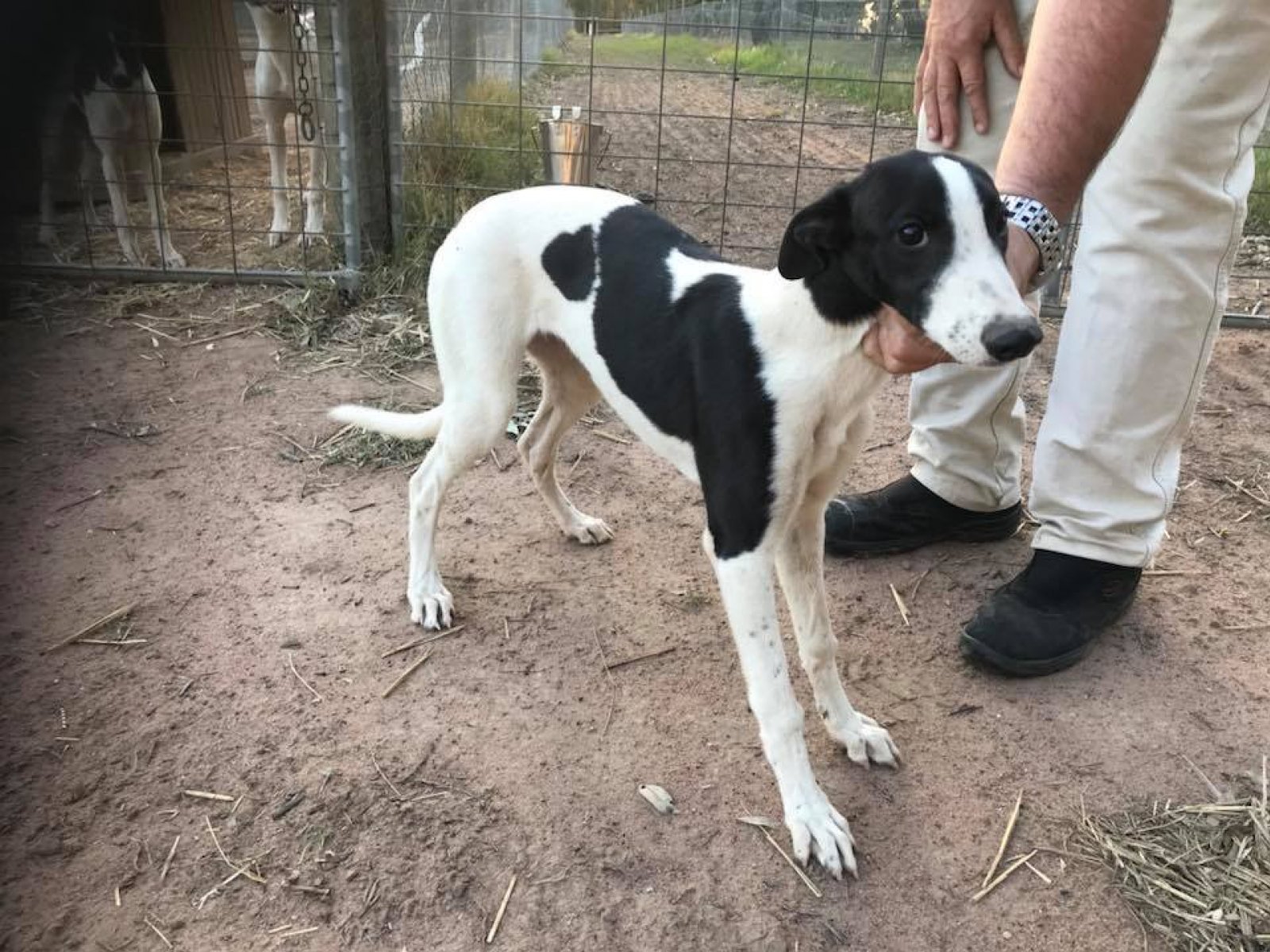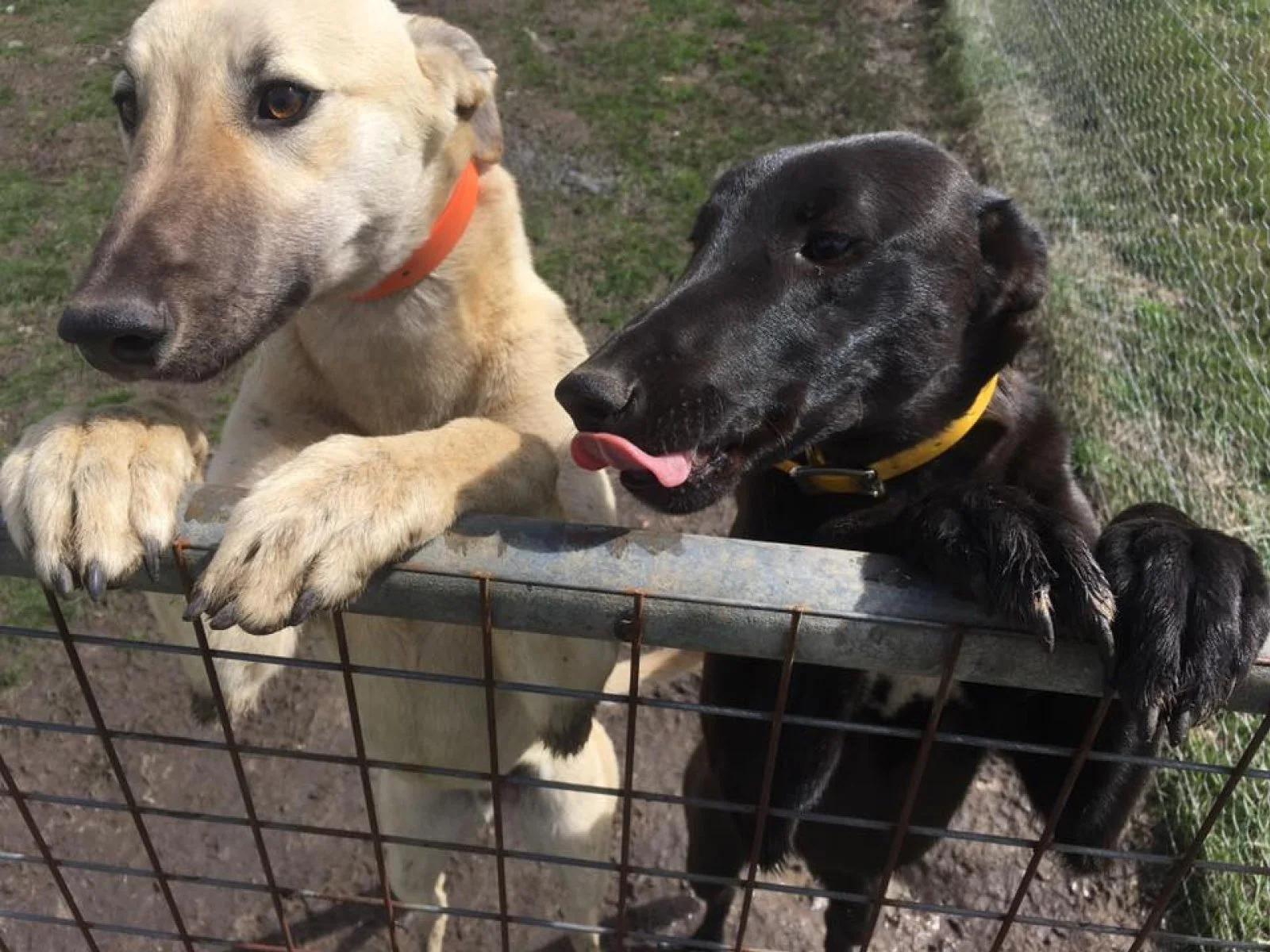Greyhound Racing NSW Adoption Contract Shows Regulator Enforced “14-Day Trial Period” for Greyhound Adoptions
Marco the greyhound, given the racing name “Uncle Donuts”. (Image: Supplied)
A Greyhound Racing NSW adoption contract from March last year shows the racing authority’s Greyhound as Pets adoption program only accepted its retired racing dogs being returned within a “14-day trial period” before refusing to accept returns, despite advising adopters that it can take “weeks” of “fear and anxiety” for racing dogs to adjust to life as a pet.
Greyhound Racing NSW was contacted to clarify whether 14-day trial period still applies to its adoption program. The regulator refused to respond.
Last week this publication published the story of Marco, a racing dog given the name “Uncle Donuts” and used to make the Canty Middleton gambling syndicate $28,500. At the end of his racing life, he was adopted out through the Greyhound Racing NSW ‘Greyhounds as Pets’ (GAP) adoption program, but after he struggled to adjust to a home with children over the space of 18 months, GAP refused to take Marco back and help safely rehome him. Instead, Greyhound as Pets staff informed Marco’s adoptive family that they did not accept greyhound returns and told them to take him “to the pound”.
Greyhound Racing NSW failed to uphold the terms of the adoption contract they required Marco’s family to sign, which stated that the adopter must return their dog to Greyhound as Pets in the event that they could no longer look after it. “If, at any time, you can no longer care for your pet you will return the pet to GAP,” the contract reads. “A surrender fee of $200 may be applicable in this instance to assist with meeting the costs of care.”
That same contract contains a mention of the GAP NSW policy of a “14-day trial period”.
Since Marco’s story was published, the response from Greyhound Racing NSW has been to publish a blog article entitled “7 Ways to Help A Greyhound Adjust to New Homes”. The regulator has not yet addressed whether telling a family to take a retired racing dog to the pound is usual workplace policy for Greyhound as Pets adoption program staff.
The new blog article by Greyhound Racing NSW claims the GAP adoption trial period has now been extended to 6 weeks—a policy change that was enacted sometime between March last year and October of this year. The change does not appear to have been publicly announced by Greyhound Racing NSW.
The NSW dog racing regulator is yet to publish policy information explaining to the public that after their weeks-long trial period expires—whether the length of that period is 2 or 6 weeks—it does not accept its greyhounds being returned.
GAP NSW: “WE DO OFFER A 14-DAY TRIAL PERIOD”
Greyhound Racing NSW did not advertise their 14-day trial period policy publicly, only mentioning it in a “rehoming agreement” contract it required adopters to sign in order to adopt a retired greyhound through Greyhounds as Pets. It is as yet unclear for how many years the racing regulator had the two-week policy in place and how many greyhounds and adopters in New South Wales have been affected by the policy.
In the contract introduction, Greyhound Racing NSW claims that their adoption policies were intended to “ensure that greyhounds being re-homed will have a safe and secure future”.
“While we hope your selection process is successful and permanent,” the contract reads, “we do offer a 14 day trial period to ascertain acknowledged behavioural abnormalities during which time depending on the problem a refund may be available. During this period you may surrender the pet for any reason and no charge will apply to the surrender.”
Greyhound Racing NSW elected to enforce a two-week timeframe as a “trial period” despite their own advice to adopters from this year that “the first few weeks can be very unsettling” for newly adopted racing greyhounds, and that the “sudden change of environment from racing kennel to pet life might be viewed by an animal with no suitable reference points for the new sights and sounds in their adoptive home” with “fear and anxiety” by the dogs. Further advice published this week by Greyhound Racing NSW states it can take up to 3 months for a dog to adjust.
The rehoming contract provided to the adopter last year appears to not have been updated for 4 years, with one contract clause referencing a price being “correct as of July 2016”, a year when the dog racing industry in New South Wales was in upheaval in the wake of the mass killings and animal cruelty reported by the McHugh Commission.
The General Manager of the Greyhound Racing NSW adoption program, Alicia Fuller, was questioned whether Greyhound as Pets NSW had updated its adoption contract in the last 4 years and whether the authority considered 14 days to be sufficient time to allow a dog to safely settle in with a family while going through a trial. Ms. Fuller did not respond.
In last section of the contract, the regulator stated that “GAP reserves the right to refuse any application for re-homing”, a statement that conflicts with their initial assertion that their adoption policies were meant to ensure NSW racing greyhounds had a “safe and secure future”.
A racing greyhound puppy, photographed in Australia in December 2018. (Source: Farm Transparency Project)
“NOT TAKING RETURNS IS A WAY TO OUTSOURCE EUTHANASIA”
According to greyhound rescue volunteers and advocates, Greyhound Racing NSW refusing to accept its greyhounds being returned after any specific period of time is another demonstration of the dog racing regulator shifting responsibility for the life-long welfare of its racing dogs onto volunteers and community rescue groups.
Julia Cockram is the Director of Gumtree Greys, a volunteer greyhound rescue group that operates in Victoria and Queensland, helping to find homes for 350-450 greyhounds each year with a strict no-kill policy. Cockram helped to find Marco a place to go after Greyhound Racing NSW refused to help his family rehome him safely—despite her volunteer organisation not being based in New South Wales—and says that it is not unusual for her to receive contact from people interstate requesting help with rehoming greyhounds.
Before finding Marco a home through her network of rescue volunteers, Ms. Cockram tried to guarantee Marco’s safety by reaching out to the Greyhound Racing NSW GAP program, but says GAP told her “no returns were accepted except in special circumstances.”
Racing adoption program dogs often experience problems adjusting to being in a home after racing, Cockram says, with the problem being so widespread that volunteer groups are unable to deal with the number of requests for rehoming GAP dogs that they receive.
“If all we took were GAP adoption program dogs experiencing problems adjusting after retiring from racing or direct from owner returns,” she says, “we would barely ever rehome a dog direct from the industry. There are too many.”
Cockram says the no returns policy instituted by Greyhound Racing NSW also allows the regulator to avoid witnessing the animal welfare consequences their business model creates.
Many greyhounds leave the industry with emotional and behavioural issues, she explains, and once adopters witness symptoms of anxiety, aggression or trauma in their greyhound, they don’t want to return it to the industry that caused the dog stress in the first place, despite wanting or needing to rehome the dog.
“We get lots of calls from public wanting us to rehome their dogs,” Cockram explains, “and generally people don't want to return their dog to GAP, as they’re certain the dog will be killed on its return.”
“[Greyhound Racing NSW] refusing to accept their greyhounds being returned is a strategy to keep down euthanasia stats,” Cockram says. “If the RSPCA didn't take dogs back their euthanasia rates would be much lower. Not taking returns is a way to outsource euthanasia.”
Young greyhounds photographed in Australia. (Source: Farm Transparency Project)
“IMMORAL FOR ANY REHOMING GROUP, POUND OR SHELTER”
After assisting Marco the greyhound and becoming aware of the no returns policy implemented by Greyhound Racing NSW, Ms. Cockram wrote two months ago to the Chief Executive Officer and Chief Inspector at the NSW Greyhound Welfare and Integrity Commission (GWIC), Steve Griffin and David OShannessy, to draw GWIC’s attention to the issue, but did not receive a response.
GWIC is the authority with oversight of animal welfare and integrity issues within Greyhound Racing NSW.
“Our view is that it is improper conduct on the part of any rehoming group to refuse to accept an animal in potential jeopardy which they have rehomed. Let alone one with that has the funds to manage returns,” Cockram wrote to Griffin on October 22.
“If a dog turns out to be dangerous in a home, GAP NSW is then outsourcing euthanasia by not taking the dog back which is completely immoral for any rehoming group, pound or shelter.”
“To refuse to accept the return of a dog imperils a greyhound that has been improperly or inadvisably rehomed and is thus wholly improper and unprofessional,” Cockram wrote.
In response to Cockram’s complaint, Griffin refused to respond to her directly, instead writing a brief email on October 23 to the Coalition for the Protection of Greyhounds—who had followed up to check on Marco’s safety—stating he had simply referred Cockram’s email back to Greyhound Racing NSW.
Griffin added in his email that GWIC had been aware of the Greyhound Racing NSW returns policy, writing to explain his “understanding” of “GAP’s greyhound returns policy”. “GAP rehomed GH’s can be returned at any point within 6 weeks and they get a full refund”, Griffin wrote.
“GAP rehomed GH’s can be returned after 6 months on an assessment basis,” Griffin continued, “to understand the reasons why.” Griffin failed to note any greyhound welfare concerns that might arise from the Greyhound Racing NSW returns policy.
GWIC was contacted for comment, but declined to respond to any enquiries, beyond referring adoption questions to Greyhound Racing NSW.
Griffin’s mention of greyhound being returned on an “assessment basis” refers to retired racing greyhounds undergoing behavioural assessments conducted on behalf of GAP NSW and being required to pass industry adoption program tests before they are matched with an adopter, meaning that greyhounds returned by their adopters to GAP NSW after the 6-month deadline could face euthanasia dependent on assessment outcomes.
GAP NSW does not publish any information on the metrics and standards used to assess greyhounds in their Greyhound as Pets program.
A redacted copy of the Greyhound as Pets rehoming contract from March 2020 is included below—identifying details have been redacted to protect the adopter’s privacy.
Have a story of your own? Message me here: matildaduncan@protonmail.com



